![[Metroactive Music]](/music/gifs/music468.gif)
[ Music Index | Metro | Metroactive Central | Archives ]
Holy Hip-Hop
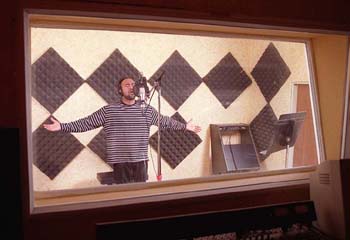 Christopher Gardner Emcee JayCee: Sunnyvale gangmember-turned-gospel-singer Jason Carter stands at the forefront of the local gospel rap movement. When rap music meets contemporary gospel, all heaven and hell break loose By Traci Hukill JASON CARTER CAN'T stop dancing. It's hour three of an all-night recording marathon, and he's standing in the glassed-in sound room all alone with his music. The bass boom and melody of "Sound of Love" are blossoming into his headphones for the 10th time today and he's still blissed out: this is his song, his time, his lucky star. His body weaves and his head bobs as he starts the second verse in a tenor smooth and rich as caramel: "A love that is pure and holy 'cause it flows from right here in this sanctuary ..." In the studio's equipment room, sound engineer Denard Fegans leaps to his feet in exasperation and shuts the music off. "No dancin' AROUND, bra!" he pleads into the intercom. "I know you're feelin' it, but you gotta stay still! Stand closer to the microphone. No--closer. Now stay there. Let's take it from the same place." Chastised, Carter makes a sincere effort to stand still. But a couple of takes later his eyes are closed and he's swaying again, singing gospel R&B in a soulful voice that makes women go dewy-eyed and men nod their heads in time to the beat. Carter makes praising God look and sound that good. He can't help himself about the dancing. Staying in place goes against everything that's natural to this 25-year-old who in the last 10 years has covered a lot of ground. At 15 he was a skinny little Sunnyvale gangbanger with a police file and a big mouth. Now he's a devout Christian, a family man with three kids and a gospel artist who's just finished his first solo CD, a compilation of sacred R&B songs and gospel raps, under the name JayCee. During a break in recording, Carter plays back a rap he recorded the night before. His style is goofy and lighthearted, but the message is all Christian business.
And it gives me joy to know I serve a risen Savior, it's not about a bunny laying eggs on Easter And when I realized this, you know I wanted to change, so I got baptized in Jesus' name Plop, plop, fizz, fizz, oh what a relief it is, filled with the Holy Ghost, tongues is the evidence And with the Lord, I came and made amends, I don't need to do drugs, I've been high ever since. To an entire sector of the faith community, gospel rap's beat alone sounds like the devil's footsteps at the door. Secular rap is so saturated with sex, drugs and violence that some critics can't even stand the thought of a cleaned-up twin in a Christian CD collection. But nowadays more churches than not recognize the futility of asking kids to insulate themselves from pop culture. Christian bookstores are packed with CDs by Matchbox 20 soundalikes and rap acts with names like the Bruthaz Grimm, along with compilations like Glory Grooves and Heavenly Hip Hop. Gospel rapper Kirk Franklin's 1996 album, Whatcha Lookin' 4, entered the R&B charts at No. 3, and his latest album went double platinum and won a Grammy this spring. Traditional rocking gospel, with its scorching blues solos by robed choirmembers, is still going strong. Walk into any black church on a Sunday morning and the music sounds better than what most people were dancing to Saturday night. That's the style that defines gospel for the general public, and it's been drawing souls to the church for decades. But the face of gospel music is changing to mirror popular culture--just as it always has--and Carter, with his good looks, honeyed voice and magnetic personality, could be its newest poster boy.
Christopher Gardner
A GOSPEL RAPPER'S STORY of sin and salvation is his stock in trade. It establishes credibility with the troubled youth he's charged with saving, and it testifies to the strength of his spirit. Finding the avenues to mainstream power closed to him, an ambitious, talented young black man seizes power in a parallel universe by turning to crime. And then when he barely escapes the prison sentence or his best friend overdoses or he almost dies, he thanks God for getting him out of the fix, accepts Jesus into his life and vows to save others. People's testimonies are practically formulaic, like the classic hero myths of antiquity. Jason Carter grew up in Sunnyvale under a "rough upbringing" and at 13 started running with a gang that called itself the SVC, for Sunnyvale Crips. Already charismatic and talented, he was voted Most Popular at school and was known for his abilities as a singer and dancer. "I had a certain clout about me," he says modestly. His old friend and former fellow gangmember Johnny Harper puts it another way. "He was this young guy who ran off at the mouth," the 26-year-old Harper remembers. "When I met him he thought no one could touch him. Jason was younger than us, but he was wilder than us. He was the one who would start the fights. More often than not, he was the ignition to the fire." Then came the night that changed Carter's life. When a rival gangmember pulled a gun on Carter and his friends during a fight, the group scattered. Carter stopped to pick up the medallion he'd dropped, and when he stood up, there was a gun at his head. "I thought, 'I'm too young to die,' " he remembers. The gunman fled when a cop car pulled up, and Carter, shaken, vowed to make a change. Shortly thereafter, two unlikely evangelists brought him to their father's church. His gangster friends Johnny Harper and Willie Harper Jr.--sons of ex-49ers linebacker-turned-minister Willie Harper--woke him up one Sunday morning and dragged him to services. That week Carter was baptized by the elder Harper. "I tore all the naked ladies off my wall," he says. "I cut 'Jesus Saves' in my hair." He made a 4-foot-by-8-foot wooden cross, got a bullhorn and started witnessing in downtown San Jose at his old hangouts, urging people to repent. He still does it sometimes. His gospel raps developed as an outgrowth of his evangelizing, as something he just did naturally. THE REV. Johnie Thompson, choir director and youth pastor of Emmanuel Baptist Church in east San Jose, spins a yarn of debauchery that would make a great movie. The climax would have to be the scene where he's just been busted selling cocaine to an undercover cop and takes off in the city bus he drives as his day gig. He shuts the doors, instructs the panicked passengers to remain calm and turns the bus onto 880, whereupon he proceeds to lose the cops. Thompson came to the Lord after drug charges were dropped that would have surely landed him in prison. He believes life as a sinner prepared him for life as a saint, working with young people who are skeptical of adults who've never seen any action. "I know now that God put me through all of that just so He could use me here in this capacity," he says. "If your life has been too goody-two-shoes, you're just talking a bunch of rhetoric." Likewise Horeish White, a local gospel rapper known as Menacesta Reese, sustained four gunshot wounds in 1993 and came to God while in jail. Now poised to release his CD The Sacrifice in July, White says he raps "so I can reach the people who are still doing what I was doing, let them know you ain't got to be perfect, you know what I'm sayin', to be forgiven." Meanwhile, neither of the Harper brothers ever made the commitment to the church their friend has. "We're the ones that brought Jason to church, and that's where we left him," Johnny Harper laughs. Harper wound up spending two years in the California Youth Authority and almost lost his life in a fight after he got out. He went on to play football for San Jose State and now works at a technology investment firm in Palo Alto. His brother, Willie Jr., an AllSanta Clara County running back from Fremont High, was shot three times by rival gang members in Nebraska in 1991. Willie Jr.'s now a Bay Area rapper. But to Johnny Harper it's not a simple case of being saved or lost. More than anything else, the church praises young men for their willingness to preach the gospel, and that's what people call him--a preacher, even though he doesn't spend much time at church. Even his co-workers teasingly call him Deacon Harper for his tendency to quote scripture. "That's what people didn't understand about my brother and me," he says. "Our whole lives are church. We do church 365 days a year. We would bring people to church and yet we didn't go--because we could see, 'Hey, you're looking for something, you're reaching for something,' and we would take them to church. Just because I'm not out there preaching the Word like Jason doesn't mean I don't accept God, don't worship God."
Under God's Spell: The choir at Bible Way Christian Center--here featuring Rolesa Smith--sings traditional gospel music, although the church is open to the influences of rap. RAP SOUNDS AREN'T the first worldly beats to infect gospel and scandalize the faithful. At another moment earlier in this century, African American spirituals joined up with music from the streets, prompting all manner of hand-wringing by church folk. Until the early 1930s, the black spirituals that had their genesis as veiled messages sung among slaves remained true to their roots--embellished, more rhythmic cousins of the hymns sung in white churches. Then Tommy Dorsey came along. A preacher's son with a love for the blues, Dorsey (not to be confused with Frank Sinatra's bandleader by the same name) played piano for the great blues singer Ma Rainey and in 1928 penned the scandalous hit "It's Tight Like That." Neither distinction did much for his relations with the church. Blues were considered the soundtrack to a life of sin, and the low moan and wail of Dorsey's hit single horrified decent folk. But three years later the prodigal preacher's kid returned to the church and scribbled bluesy spirituals like "Precious Lord" as fast as he could. At first the churches ignored him, put off by his sordid past and his music's worldiness. Then, as now, when church people used the term "the world" they meant an evil, dangerous place that tempted the Christian soul from the straight and narrow. Nothing symbolized "the world" at that time like the blues did, with its whiff of gin and dirty dancing. But the Depression brought hard times, and eventually the magic formula of soulful music plus hopeful message overcame suspicion. The blues fit the times, and gospel moved to take full advantage of that. Which is exactly what it's doing now, explains Emmanuel Baptist's Thompson. "God allowed the older gospel music style to go from generation to generation," he says, "but as society changed it didn't have the same effect. His grace allowed it to make a change, turn a corner. Now we have a new gospel music with R&B style, rap style." Thompson's written a few raps of his own, though he doesn't look the part. He wears suits with suave accents--gold watch, colorful tie, spicy cologne. He's a powerful man with a small build and eyes like a fox's, quick and clever. "People come to the black church because of the music. What the music does, it sets your heart up to receive the Word. We're talking biological now. It gets those neurotransmitters going in the brain, and they send a message to the heart to open up, and the heart sends a message right back to the brain: 'This is good! Send some more!' It's nothing but spiritual food." The Emmanuel Baptist Male Choir performed its contemporary R&B-based gospel at Ron Gonzales' inauguration, and a mostly rhythmless stageful of city councilmembers and dignitaries awkwardly clapped and attempted to boogie. "People were up on their feet, clappin' their hands, having a good time," Thompson recalls about the blending of church and state at an official municipal function, "and"--he leans forward--"we were singin' about Jesus. We had Susan Hammer clapping her hands--now, how do you get Susan Hammer to get with it?" He leans back in his chair. "That's what happens when you get a group of men together singing about Jesus."
Christopher Gardner
ON A SUMMER MORNING in the late 1970s, sunlight pours in the windows of a little white church in rural East Texas. In the pulpit a pale, thin man with a forlorn expression is leading his aging flock through hymns, their quavering voices frail and naked against the silence of the new day. My grandmother's gardenia perfume and those simple hymns are the best things about church, in my youthful opinion. The tremulous strains of the music float out of the building, roll over the old cars parked in the churchyard and drift out to the deserted highway to finally evaporate in the shimmering heat. Draw me nearer, nearer, blessed Lord, to the cross where thou hast died ... No one dances in the Church of Christ or claps or shouts Hallelujah. Musical instruments are forbidden. If the Lord wanted us to use a piano or organ to worship Him, the wisdom goes, He would have instructed us in the Bible accordingly. The Church of Christ has a reputation for joylessness. People tell jokes about it: Why don't Church of Christers have sex standing up? Because it's too much like dancing. Most African American churches--most churches, period--are more flexible than the Church of Christ, but Jason Carter has still encountered opposition to his music from black churches. In Sacramento, where he sang and rapped with a Boyz II Menstyle gospel group called Step of Faith, he was often criticized. "One place, the pastor set me down afterward and said, 'I'm disappointed in you,' " he recalls, " 'because you have such an anointing in your life. When you rapped,' he said, 'you gave me a bad taste in my mouth.' I tried to get him to see how we were just reaching out to souls, but his concern was that we shouldn't compromise the message. It was hard, because I really respected this man." Willie Mae Ford Smith would understand Carter's distress. One of the first to use a heavy blues sound in her gospel singing, she blew minds in the early '30s and was upbraided for it. In the documentary film Say Amen, Somebody, she recalls the sting of the accusations and her ultimate response. "They said I was bringing the blues into the church," she says. " 'You might as well be Mamie Smith, Bessie Smith, one of those Smith sisters, you make me sick with that stuff.' Well, I said, that's all the stuff I know. I kept going because that's what the Lord wanted." ON THE OTHER HAND, Carter tells about one Step of Faith concert at a water theme park that made him wonder if his music was too worldly. The show was for a church of several thousand members who received the quartet warmly. Steamily, even. "They loved us to death," he says. "They had"--he laughs a little telling it--"they had all these church people, but they were wearing bikinis! And I remember, we were up there singing and this one person was really dancing and getting into it--and I remember I was feeling awkward onstage, wondering, 'Whoa, is this wrong?' So there is an extreme. You can take it too far." One oft-cited example of overdoing cool is the L.A.-based group the Gospel Gangstas. With their braided hair, saggy pants and slangy lyrics, Da Demon Recka, The Holy Terra, Da Gangsta Poet and The Holy Hoodlum set off alarms all over the gospel community. The violent imagery--even if it is about violence against the devil--is the hottest button:
But I'm smarter, I comes a little harder, I pack a 9 for those thinkin' of makin' me a martyr Me wrestle against the flesh, I'm not saying that, but comin' up on me, devil, I ain't playin' that. Much about gospel music requires the balance of worldiness and holiness, like the art of dancing in church. Rocking from side to side is OK, even jazzed-up swaying with a little hip shimmy is acceptable, but front-to-back pelvic thrusting is strictly forbidden. The trouble is, some of the choirs around here are so good it's hard to remember to dance nice. At Bible Way Christian Center, Pastor Oscar Dace, working miraculously under the burden of needing a kidney, has positioned his church to be an up-and-coming leader in the South Bay African American community. Michael McBride, the young man whose mistaken detention by San Jose police in March led to a controversy over police profiling, is a youth minister there. The church hosts an old-time gospel quartet called The Legget Brothers and a 75-member choir that released a CD in January. Quite simply, the choir rocks. Backed up on organ by director Tammy Brown (she also delivers fabulous solos), plus drums, bass and lead guitar, the choir raises the roof with soaring vocals and energetic dancing (of the side-to-side variety, of course). It's living proof that traditional gospel music is alive and well. And it's a stronghold of musical talent. "This church is really on the move," says Carter, who is in the midst of changing membership from Jesus Christ for All Nations in Fremont--Willie Harper's church--to Bible Way. "This time next year it's going to be a Mecca of gospel music. There's so much talent there." The mannerly Church of Christ experience of my memory cannot explain Jesus Christ for All Nations in Fremont, where the service is nearly three hours long and a saxophone player serenades people speaking in tongues. Nor does it apply to Emmanuel Baptist, where a man leads a prayer that turns by degrees from speech into a half-sung, half-chanted blues solo, or to Bible Way Christian Center, where Pastor Oscar Dace winds up his sermons with an impromptu musical invocation, a sort of trancelike spoken song. In these churches, something different happens. The left side of the brain shuts down at prescribed times, logic takes a hike and something else moves in--inspiration, the Holy Spirit, whatever you want to call it. It's powerful.
Christopher Gardner
CHURCHGOERS' FAITH--the kind they like to say can move mountains--often resembles what's called arrogance in other contexts. But Christians always give God the glory. God allows great things to befall them. So when Carter answers the question of whether he will be successful by saying, "I know it's gonna happen. I already got the promise from God," it's impossible to tell whether he's full of faith or full of himself. Superstar gospel performers are like rich devout Christians, left to walk on the slippery slope of worldly success. Gospel has lost countless performers to the world: Sam Cooke, Dinah Washington, Aretha Franklin, Dionne Warwick--the list goes on. But staying in gospel music is no guarantee of prolonged holiness either. The Queen of Gospel, Mahalia Jackson herself, was criticized for allowing Columbia Records to dilute her potent style in the interest of broadening her appeal. No babe in the woods, Jackson was famous for her business acumen. Her business ventures at one time included a chain of fried chicken stores a la Kenny Rogers. Carter says he's constantly aware of the threat of the secular world. He used to attend church with a prime example of what can happen when an artist strays from the gospel calling--the great MC Hammer. Hammer began his career in a gospel act called the Holy Ghost Boys. When Capitol Records got ahold of his sound and repackaged it, Hammer wound up going almost completely secular, though he always included a sacred song or two on each album. Three Grammys, 25 million records and an estimated $33 million later, Hammer was riding high. Then came the Mattel Hammer doll and the Taco Bell endorsements, and people started accusing him of selling out. His popularity plummeted, and in 1996 Hammer declared bankruptcy and sold his 12.5-acre estate in the Fremont Hills, labeling his problem "the business drug" that most successful artists can't recognize. Hammer's making gospel music again--he's in London recording right now--but his story stands as a cautionary tale to Carter. "I need to be concerned about it," Carter says, "because it's happened to so many people. I don't think I'm beyond that temptation, but I have to keep myself close to God. That's why my first project is Keepen It Real." Back in north San Jose's Upper Room Recording Studio in the first week of May, Carter is nearly finished recording. He's finally laying down the title track, and he's imported family friend Edna "Nikki" Owens to help out with harmony. While Denard Fegans works the computerized digital recording program, Owens eats a Twizzler and nods her head to the music, lost in thoughts of harmonic lines she's making up on the spot. Carter, meanwhile, lays down the tracks, dancing this time without reprimand. "He didn't listen to me," Fegans says, defeated. "As long as his vocals are coming through, I'm OK." "Keepen It Real" is a song about the hypocrisy of people who maintain a veneer of holiness while enjoying the world's sensual pleasures. Naturally it's written in Carter's humorous style.
On the dance floor getting numbers from the ladies and you got more babies than a dog has rabies ... Between takes Fegans makes a face. "I have a problem with some of his raps. They're too corny," he asserts. "When you rap, you kind of have to get the approval of a certain crowd, if you will." Carter takes this critique in stride, grinning and dancing in place while Owens expresses shock at this harsh treatment. "Oh, no," Carter says. "We're open about it. That's just not my style, that hard-core rap. I'm gonna make people laugh, have a good time." He finishes the rap. "Keepen It Real" just might be his own personal doctrine, speaking to his desire to preach the word, inspire others and remain genuine:
And can't no one stop this flow 'cause I believe it's 'bout to go from shore to shore Touching every single man, woman, boy and girl, heck it's 'bout to go across the world. Across the world is a long way from Sunnyvale. Jason Carter's going to need a lot of faith to get there--either that or a lucky star. No matter. He seems to have both in abundance. The way things have gone for him so far, he'll be just fine. [ San Jose | Metroactive Central | Archives ]
|
From the May 20-26, 1999 issue of Metro.
Copyright © Metro Publishing Inc. Maintained by Boulevards New Media.
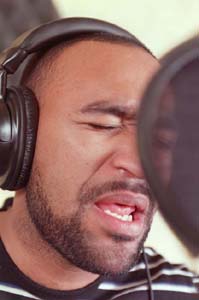 Gift Rapped: Gospel rapper Jason Carter counters critics by saying that rap music is just another instrument to reach souls.
Gift Rapped: Gospel rapper Jason Carter counters critics by saying that rap music is just another instrument to reach souls.
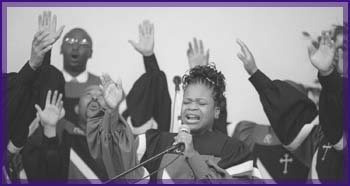
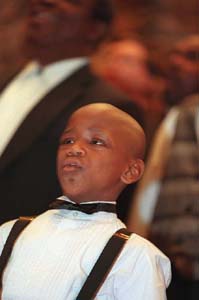 Child of God: Young Arron Kelly adds his voice to the joyful noise that rocks the East side's Emmanuel Baptist Church on Sunday mornings.
Child of God: Young Arron Kelly adds his voice to the joyful noise that rocks the East side's Emmanuel Baptist Church on Sunday mornings.
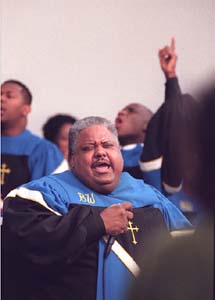 The Word Up: Vincent Harris of Bible Way Christian Center delivers the kind of powerful blues-inspired solo that has come to represent traditional gospel's trademark sound.
The Word Up: Vincent Harris of Bible Way Christian Center delivers the kind of powerful blues-inspired solo that has come to represent traditional gospel's trademark sound.